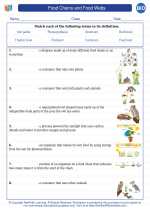Food Chains and Food Webs -> lysosomes
Lysosomes
Lysosomes are membrane-bound organelles found in the cytoplasm of eukaryotic cells. They are known as the "garbage disposal" or "recycling center" of the cell, as their main function is to break down various biomolecules, such as proteins, nucleic acids, carbohydrates, and lipids, into their basic building blocks for recycling or waste disposal.
Structure of Lysosomes
Lysosomes are spherical organelles surrounded by a single membrane. They contain a variety of hydrolytic enzymes which are capable of breaking down different types of macromolecules. The interior of the lysosome is acidic, which is essential for the optimal activity of these enzymes.
Functions of Lysosomes
Lysosomes play several important roles in the cell:
- Digestion: Lysosomes are responsible for breaking down and digesting cellular waste materials, old organelles, and foreign substances that enter the cell through a process called autophagy.
- Recycling: After breaking down macromolecules, lysosomes release the resulting building blocks (such as amino acids, nucleotides, and sugars) back into the cytoplasm for reuse in the cell.
- Cellular Defense: Lysosomes are involved in the destruction of engulfed pathogens, such as bacteria and viruses, in a process called phagocytosis.
- Programmed Cell Death: Lysosomes are also involved in a process called apoptosis, where they release enzymes that lead to the degradation and eventual death of the cell.
Study Guide
To understand lysosomes better, here are some key points to focus on:
- Describe the structure of lysosomes and the composition of their membrane.
- Explain the function of lysosomes in the cell, including digestion, recycling, cellular defense, and programmed cell death.
- Discuss the importance of lysosomes in maintaining cell homeostasis and overall cell health.
- Compare and contrast lysosomes with other cellular organelles, such as peroxisomes and endosomes.
- Explore the role of lysosomes in various diseases, such as lysosomal storage disorders, and the potential therapeutic implications.
By understanding the structure and functions of lysosomes, you will have a broader appreciation of the intricate mechanisms that operate within eukaryotic cells.
.◂Biology Worksheets and Study Guides High School. Food Chains and Food Webs

 Worksheet/Answer key
Worksheet/Answer key
 Worksheet/Answer key
Worksheet/Answer key
 Vocabulary/Answer key
Vocabulary/Answer key
 Vocabulary/Answer key
Vocabulary/Answer key
